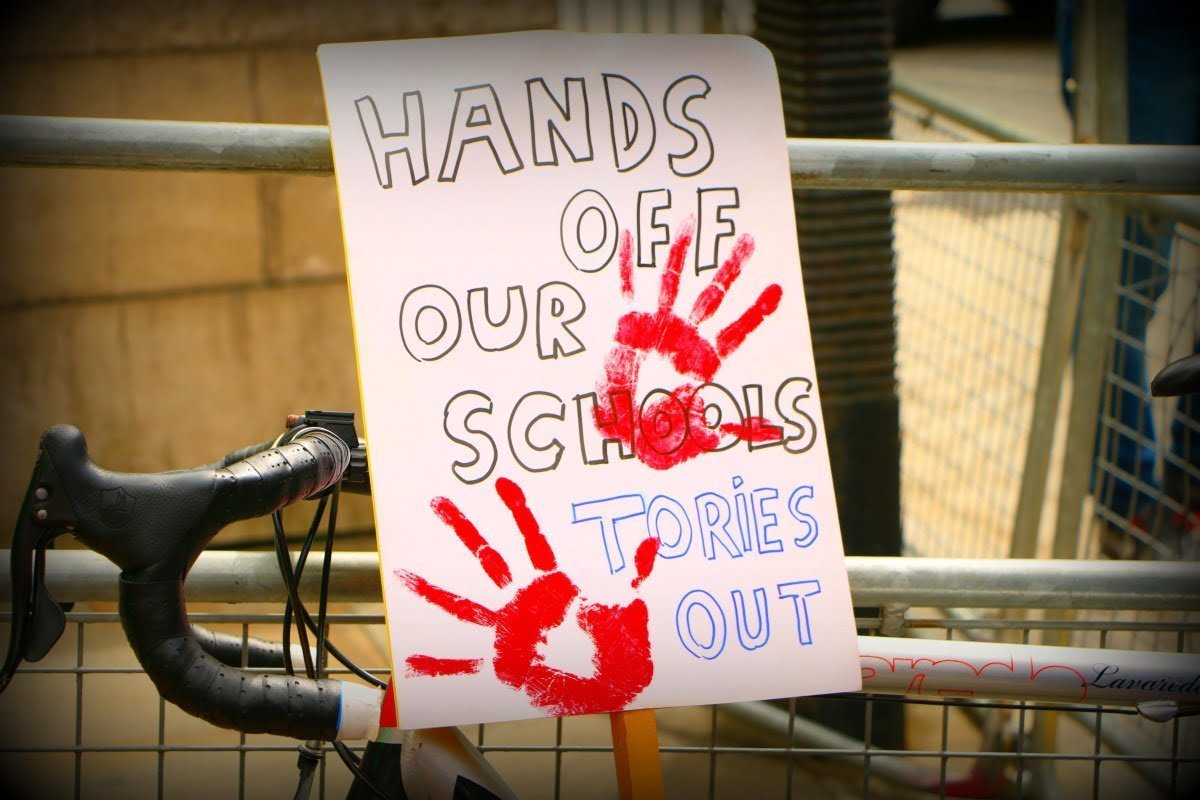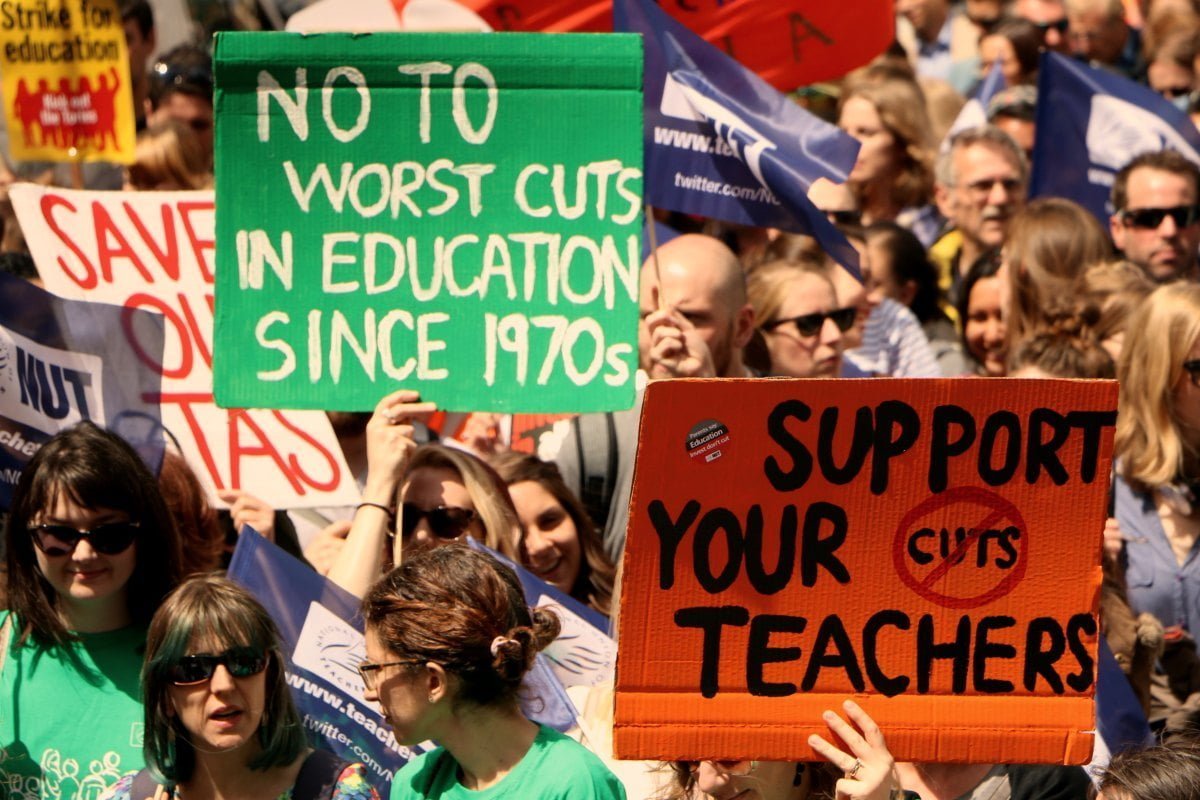The National Union of Teachers (NUT) has just held its last national conference before merging with other teaching unions to become the National Education ‘super-union’. This year’s conference, however, was notable for seeing teachers vote to strike against Tory cuts that have left staff overworked and schools under-funded.
The National Union of Teachers (NUT) has just held its last national conference before merging with the Association of Teachers and Lecturers (ATL) to become the National Education ‘super-union’ in September.
This conference, however, was also notable for other reasons, taking place amid droves of teachers leaving the profession due to unsustainable workloads, with a 54.4 hour average working week, compounded by a public sector pay freeze that has seen a real terms pay cut of 15% since 2010. Added to these are the pressures of performance related pay and a looming mental health crisis for both pupils and staff. This conference, therefore, exposed the vast extent of teacher dissatisfaction with the profession and the Tories’ educational policies.
Voting to strike
The Tory Party has overseen cuts to the education budget that have left some schools literally begging for funding from parents. They have put into practice the new SATS tests – despised by children, parents and teachers alike – and have pushed for a huge increase in the number of Academies, the removal of drama and music courses to save money, and the implementation of the hated Prevent agenda.
It is no wonder, therefore, that this year’s NUT conference responded with a vote for strike action, seeing it as the only way to make the government listen to what teachers have literally been shouting about for years. Teachers’ opinions have been consistently ignored as these huge educational changes have been forced through, further devaluing the profession and those who work within it. The anger amongst teachers is palpable.
Conference voted in favour of regional strikes against funding cuts and changes to the national funding formula, which will see half of English schools losing up to 11% of funding per pupil. In real terms, schools have said that these cuts will mean they are unable to fulfil their legal obligations, such as getting DBS checks completed, never mind the affect that the cuts will have on schools’ abilities to fund safe and equipped classrooms. The strikes will take place this summer term on an existing ballot in the worst affected regions.
The motion passed means the union will consider industrial action in the parts of the country hardest hit by funding cuts. The NUT general secretary, Kevin Courtney, added that any government moves to reduce funding further could lead to a national strike.
This action coincides with the vote made by delegates at the NASUWT teachers’ conference (taking place simultaneously in Manchester), who also backed possible strike action over teacher workloads.
Where is all the money?
 Despite Kevin Courtney’s statement that schools in England would be worse off in real terms by £3bn over the next three years, the government have declared that they are spending more money on education now than ever before.
Despite Kevin Courtney’s statement that schools in England would be worse off in real terms by £3bn over the next three years, the government have declared that they are spending more money on education now than ever before.
This begs the question: where is that money going? It is certainly not being seen in schools, where the funding crisis has meant that children sit in woolly hats and gloves in classrooms as there is no budget for heating; teachers paying for pens and paper to complete lessons with; and food and clothing being bought for children by teachers in some areas.
Added to this are a raft of reports about malnutrition being spotted in children who have suffered over the holidays in poverty-stricken homes. Schools have a huge responsibility and often fill in the gaps left by austerity cuts elsewhere. Thus, the funding crisis means real suffering far worse than sitting in a chilly classroom.
Furthermore, it is irrelevant for the government to compare the funding situation now to the past. There are myriad factors meaning that more funding is needed in schools, from an increased number of pupils; rising costs of food and supplies; rising inflation affecting teacher pay and pensions, and so on.
But crucially, we should be asking why hundreds of thousands of pounds are being spent on Academy bosses’ salaries (some as much as £420,000!) when teachers are having to work longer hours for the same pay, buy in their own equipment for children to use, and children are coming to school in unsafe and unheated classrooms.
Worked to the bone
Also discussed at conference was the wellbeing of teachers, which is a major concern given recent statistics showing that nearly a third of the teachers who had joined the profession in 2010 had left teaching within five years. In addition, 90% of NUT safety reps have confirmed that stress is their number one concern, caused by unmanageable workloads, a poor work-life balance, and excessive accountability of teachers tied directly to pupils’ results and also linked to their appraisals. Rapid change is needed to reduce workloads, in order to address the decline in teachers’ welfare and mental health problems.
Despite three sessions debating the issue of the gruelling new SATS tests, which have seen children placed under excessive pressure to achieve (and teachers even more so), NUT delegates voted against a motion calling for internal ballots of members over a possible boycott of SATS next year. Some members expressed anger against this decision, suggesting that if the NUT is not ready to take action against the SATS now then it never would be. Some movement has been seen from the government recently with regard to the SATS, with the suggestion that the tests will be scrapped for 7 year olds. But this is remains unsatisfactory, as it is the SATS for 11 year olds that cause the most stress. It would have been encouraging to see teachers in the NUT take a stand against entirely unnecessary testing and pressure for young children.
Finally, a motion for the NUT to officially affiliate to the Labour Party for the first time was narrowly overturned after just 50.6% backed an amendment that blocked the move. This is a huge opportunity missed, as it would have given political weight to the union’s calls for change, especially given the recent announcement of a general election, in which the NUT are hoping education will be a core issue.
Action speaks louder than words
 What we really need is a massive reduction in the hours teachers are expected to work, giving teachers more time to prepare classes and to nurture those in our care. Funding needs to be increased to cover basic costs such as equipment, food and heating. And teachers need to be listened to and treated as the professionals that they are.
What we really need is a massive reduction in the hours teachers are expected to work, giving teachers more time to prepare classes and to nurture those in our care. Funding needs to be increased to cover basic costs such as equipment, food and heating. And teachers need to be listened to and treated as the professionals that they are.
In order for this to happen, teachers need a direct voice to make and vote on policy that affects education. In short, the education system should be placed entirely under national public control and run democratically by teachers and parents. Education staff on the frontline and working class families in local communities have a far greater understanding of what is needed to improve education and conditions for teachers and pupils than the privately-educated imposters of education ministers who have never taught a day in their lives and have no concept of the physical and emotional strain teachers are put under every single day.
Desperation for change is growing, and with it an anger and a militancy within the teaching profession. This now needs to be channelled into action. The words of teachers have been ignored for long enough. It’s time to speak with united action and strikes to force the government to listen to the real experts – teachers.






